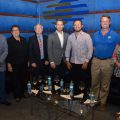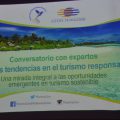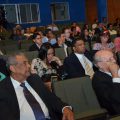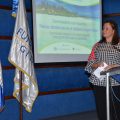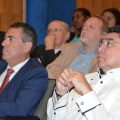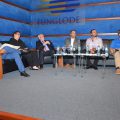
Quality over Quantity: A Discussion on Sustainable Tourism in the Dominican Republic
August 29, 2017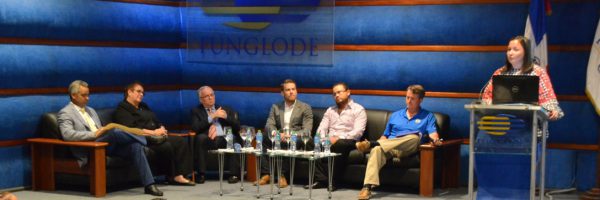
Santo Domingo – Domestic and international experts convened at Funglode headquarters to discuss new trends in sustainable tourism. They assured that the key for development is in utilizing both natural and cultural resources.
The tourism sector in the Dominican Republic needs to take advantage of the natural and cultural resources within the country to improve the industry and attract mindful tourists, thereby adding value in services.
This was one of the reflections shared in the discussion on “New trends in responsible tourism – A comprehensive look at emerging opportunities in sustainable tourism,” organized by the Global Foundation for Democracy & Development (GFDD) through its Dominican Republic Environmental Film Festival (DREFF) and sister organization in the Dominican Republic, Funglode.
The event, which was held on Monday the 28th, counted on presentations from Joel Santos, President of the National Association of Hotels and Restaurants (ASONAHORES); Jake Kheel, Vice President of the Grupo Puntacana Fundación; Elizabeth Tovar, President of Turenlaces and Vice President of OPETUR; David Searby, President of BeachCorps; Francisco Carreras, private entrepreneur and adviser to the Presidency of the Dominican Republic on cruise industry matters; and Jonathan Delance, Coordinator of the Coastal Biodiversity and Tourism Project of the United Nations Development Programme (UNDP) .
“There can be no sustainability with poverty,” stated the president of ASONAHORES, who assured that the tourism industry of the Dominican Republic “has changed for good.”
Santos expressed that there is a demand for sustainable tourism in the Dominican Republic. “Tourists will demand sustainable destinations and will be disposed to pay more for them,” he highlighted. Santos added that “sustainability in tourism should be seen as a way of adding value and being able to definitively increase prices.”
“Tourists come looking for what’s being offered, in this case it’s culture; peoples’ identities as well as natural resources. We derive economic value from the use of these two variables,” affirmed Delance, who underlined that sustainability in tourism needs to make sure that those resources “last forever.”
The President of BeachCorps, David Searby, professed that in order for there to be sustainability in the tourism sector, “you have to think about the environment, its social and economic aspects, through the generation of employment.”
“Dominican tourism has been extremely successful, it has won over the world, but I don’t believe that the model that we have used up until now will be fit for the future,” Searby underlined. He recommended the development of new long-term strategies which would “assure that people take advantage of tourist attractions throughout the country.”
Within the sector, new strategies which advertise tourist attractions in each province should be developed. “New types of interactions should be sought with tourists,” urged the Jake Kheel, Vice President of the Grupo Puntacana Fundación. He also encouraged the use of natural resources which “exist in the South but not in the East,” taking into account that the South would not need to “pursue the all-inclusive model.”
Concerning tourism sector regulations, for Tovar, sustainability is not possible “if the majority of businesses engage in questionable workforce practices.” She urged that “in this moment, an effort should be made not to implement more regulations, but to apply fair regulations which allow Dominicans to work legally and compete with others to assure sustainability.”
In referring to improvements in the cruise industry, Francisco Carreras assured that “39% of cruise ship passengers choose destinations based on their sustainability or the programs they implement.”
Carreras added that sustainability can be a valuable marketing tool and will continue to be of relevance in the future.
María Victoria Abreu, International Affairs and Socio-Economic Development Program Manager of GFDD, provided the event’s opening remarks. During her moderation of the activity, she underlined the fact that more and more countries and tourist destinations are developing policies to bring about “sustainability in one of the principal economic activities around the world, and certainly one of the most meaningful activities in the Dominican Republic.”

-
In Collaboration with DREFF, “Alimento” Screened at Colleges and Universities Through the Faces for Hunger 2019 Festival
October 21, 2019 -
Final Countdown! Less Than a Month Until the Seventh Edition of the Dominican Republic Environmental Film Festival
October 18, 2019 -
DREFF Is Back! The Dominican Republic Is Set to Enjoy a November Full of Environmental Films and Experts—and a Lot of Surprises
August 23, 2019 -
DREFF and UNIBE close Environment Week with the documentary Revolution
June 12, 2019 -
At the International Book Fair, ReCrearte workshop participants discover the potential of creative recycling
May 7, 2019 -
Dominican Documentary “Cacú: un cambio por la vida” Screened in Packed Funglode Auditorium
March 29, 2019






